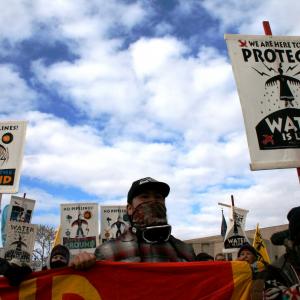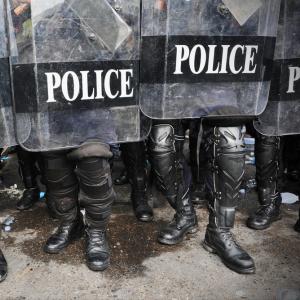
M.T. Dávila, Ph.D., is Associate Professor of Christian Ethics at Andover Newton Theological School.
Posts By This Author
'The police are highly militarized.'
The primary goal of law enforcement in these situations ought to be peacekeeping, not the protection of corporate interests.
THIS TEXT SENT BY a relative at Standing Rock confirms the images we’ve been seeing from the Standing Rock demonstrations against the Dakota Access pipeline in North Dakota. On the evening of Nov. 20, local police with armored vehicles fired at water protectors and their allies with water cannons, tear gas, rubber bullets, and percussion grenades; hundreds were injured and several taken to the hospital.
Once again we are at the crux of legitimate protests, private corporate interest, and the use of police and military force to address the situation. Fall 2011 saw law enforcement dismantling Occupy Wall Street encampments throughout the nation, while various Black Lives Matter demonstrations from Ferguson to Baltimore have faced similar confrontation by law enforcement. In all these cases, law enforcement prioritized protection of private property.
This fall, the Morton County sheriff’s department in North Dakota put its muscle behind the companies building the Dakota Access pipeline. The relationship between the use of force for the establishment of order and corporate interests being represented by the government is a tangled and messy system that has been vividly on display at Standing Rock.
The ongoing militarization of the government’s responses to protests over the past five years raises the question of whether there is a legitimate role for law enforcement, including the National Guard, that does not violate the just war criterion of excessive and disproportionate force.
A number of law enforcement programs and districts are having success through the establishment of de-escalation training and principles in their ranks. By putting in place strategies that de-escalate the need for force, either from the protesters or law enforcement, space is opened for negotiations and resolution.
Military force should in no way, shape, or form be used for the protection of corporate interests, particularly over the well-being of persons. The primary goal of law enforcement in these situations ought to be de-escalation as peacekeeping for the sake of avoiding excessive and disproportionate force and for the protection of the dignity and integrity of all involved.
The Military Force at Standing Rock Should Make Us Angry, But Shouldn’t Surprise Us

Standing with Standing Rock, Nov. 15. by Leslie Peterson / Flickr.com
“The police are highly militarized.”
This recent text sent by a close relative at Standing Rock confirms the images we’ve been seeing from the #NoDAPL #StandingRock protests against the Dakota Access Pipeline in North Dakota. On the evening of Nov. 20, local police with armored vehicles fired at water protectors and their allies with water cannons, tear gas, rubber bullets, and percussion grenades; hundreds were injured, and several taken to the hospital. Because of the frigid overnight temperatures in the region, medics at the scene were concerned that the use of water cannons would result in severe medical emergencies or even deaths among the members of the encampment.
